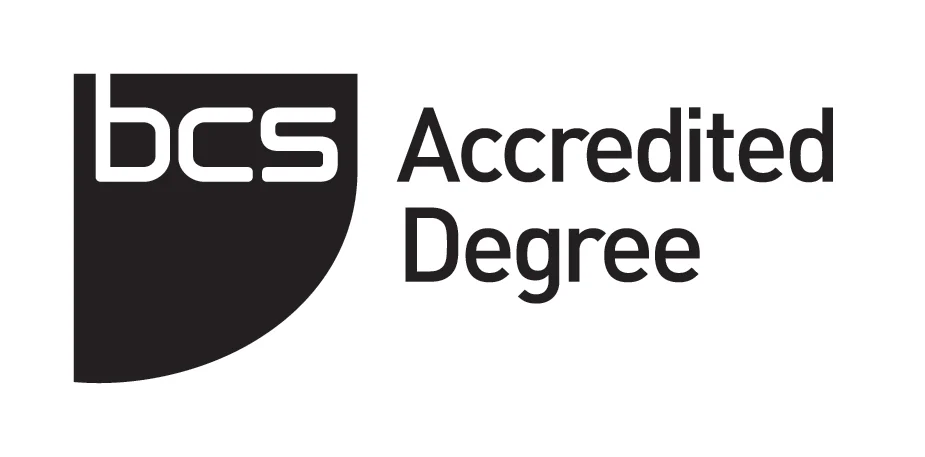
Artificial Intelligence
Full-time
Part-time
One year
Three year
September 2026
In a nutshell
Artificial intelligence is poised to take a leading role in our daily lives. Powerful big data combined with intelligent machine learning will change how organisations function and how we use and experience services. If you’re ready to be part of this exciting digital transformation, our Artificial Intelligence postgraduate degree will equip you with in-demand knowledge and skills.
Businesses and organisations in many industries are discovering how AI can transform productivity, realise efficiencies, and introduce personalised products and services. To build AI capacity, many will rely on skilled professionals to oversee its integration, governance and monitoring. Predicted to be one of the UK’s fastest growing career fields over the next decade, now is the time to develop relevant skills to take advantage of exciting opportunities.
Based on research in Machine Learning and Deep Learning, our Artificial Intelligence masters degree course delivers specialist knowledge that connects to trends emerging in healthcare, commerce, transport, professional services and the built environment. Available with full and part-time study pathways, and with start dates each January and September, we recommend the course as a platform for graduates and existing professionals to build knowledge and skills that can lead to exciting career opportunities.
The University of Salford is a great place to start your artificial intelligence journey. Location at the heart of Greater Manchester, home to one of the fastest-growing tech communities in Europe, we use our industry collaboration strategy to provide you with access to real-world projects and career networks. We’re also a delivery partner in the Greater Manchester AI Foundry, our region's plan to empower businesses and organisations to take advantage of machine learning and intelligence.
This degree has been accredited by BCS, The Chartered Institute for IT. Accreditation is a mark of assurance that the degree meets the standards set by BCS. A full CITP accredited degree entitles you to apply for professional membership of BCS and meets the evidence of breadth of knowledge in the assessment for registration as a Chartered IT Professional (CITP). A partially accredited degree provides a valuable contribution towards professional membership and evidencing breadth of knowledge. Some employers give preference to applicants who have accredited degrees, and an accredited degree is likely to be recognised by other countries that are signatories to international accords.
International applicant? Please check international intakes for the latest information and application dates.
Start your MSc Artificial Intelligence study journey
Register for our next Open Day where you can learn more about the course, tour our impressive new computing suites and meet the tutors
You will:
- Engage with advanced methods and techniques such as Deep Learning and Natural Language Processing
- Develop practical skills as you learn how to develop AI application using Tensorflow and Keras
- Experience specialist labs, computer workstations, and online tools supported by research-active tutors and technicians
students accepted
Course accreditations

This is for you if...
You're a recent graduate looking to add artificial intelligence knowledge and skills to enhance your first degree in computing or a computing related discipline
You're an industry professional seeking to enhance your existing skills and knowledge for a future career focus in artificial intelligence
You're a knowledge-seeker and want to explore the 'art of the possible' in using artificial intelligence to address global and societal challenges
All about the course
Get ready to join the digital revolution. Our MSc Artificial Intelligence postgraduate degree offers advanced knowledge and skill development, driven by industry collaboration, and delivered in research-focused learning environment.
"At Salford, we strive to provide our students with skills for the future. This new and exciting course is a perfect example of how we adapt and pivot to our ever-changing world, and is a direct response to the exponential importance of AI and the role it plays in our digital lives."
Professor Sunil Vadera
Course delivery
The course is delivered through a range of highly-focused modules. The 180-credit MSc award comprises four taught modules, plus a research dissertation. The 120-credit PgDip award comprises four taught modules.
Flexibility is at the heart of our learning approach. You can choose to study this postgraduate course full-time or part-time on campus, with start dates in January and September:
- Full-time students will complete taught modules in each of the first two trimesters, and complete the 60-credit dissertation project in trimester three
- Part-time students will complete taught modules in years one and two, and complete the dissertation project in year three
During your studies, you will have access to specialist project labs, computer workstations, and online tools. You will also benefit from our strong links with local businesses through our membership of the Greater Manchester Artificial Intelligence Foundry.
The course timetable is designed to allow students with other commitments to structure their week around teaching sessions.
During the 2024/25 academic year, full-time students are on campus:
- Trimester 1 - three days per week; Mondays, Thursdays and Fridays.
- Trimester 2 - Three days per week; Tuesdays, Wednesdays and Fridays.
Part-time students are on campus two days per week, with their studies split over two years.
While we cannot guarantee this exact schedule for future years, this provides and example of how we aim to deliver the course each year.
Course content
Drawing on research in machine learning and deep learning, our course provides you with a systematic understanding of AI techniques that will enable you to develop and apply AI solutions in a range of settings. Along with developing technical skills, you will also develop research and professional skills, so you can be ready to meet the needs of employers in this exciting and rapidly evolving field.
Current course topics include data mining, big data analytics, deep learning and natural language processing. We regularly review module content with our industry partners to ensure your acquired knowledge and skill set reflects trends and needs within professional and business communities. Learn more about the current course modules in the section below.
Course team
The Artificial Engineering postgraduate programme is delivered by an academic team with extensive industry experience and research connections, and a track record of developing software solutions through industry partnerships.
Course leader: Professor Sunil Vadera
Read about Arunima's experience on the course:
Big Data Tools and Techniques (AI)
This module will introduce you to Big Data, the characteristics that define it, and the challenges and opportunities it presents. You will learn how cloud computing, distributed data processing frameworks, and NoSQL databases can be used to ingest, process, analyse and store massive, complex datasets. Alongside this, practical workshops will give you hand-on experience working with a wide range of real-world datasets, including unstructured text data, image data and data from Internet of Things sensor networks. You will learn how to use Apache Spark to process large-scale data and apply data analysis, data visualisation and machine learning techniques.
Deep Learning
This module is designed to develop your understanding of the fundamental principles and theories of deep learning.
The module content covers topics such as convolutional neural networks, recurrent neural networks, sequential networks, transformers and their applications.
Natural Language Processing
In this module you will develop your skills and understanding of Tokenisation, Stemming, and Segmentation, and Maximum Entropy Models, Semantics, Text classification and Neural Network Architectures for NLP.
MSc Project
The project module aims to provide you with an opportunity to integrate learning from the course modules, working under the direction of an academic supervisor to carry out high-level coordinated academic and practical work on researching a suitable problem and developing, evaluating and critically assessing a robust, scalable and usable solution.
Machine Learning and Data Mining
In this module, you will work through the complete data mining process, from fundamental concepts and data preprocessing to techniques such as association rule mining, clustering, classification, feature selection, and ensemble methods. You will also explore neural networks, deep learning, and text mining with sentiment analysis. Through hands-on Python and Microsoft Azure Machine Learning workshops, you will apply these supervised and unsupervised machine learning methods to real datasets and build practical skill in extracting meaningful insights from data.
We take a flexible approach to our course delivery that promotes diversity and inclusivity and provides a blended learning experience, which will vary to meet specific programme requirements. This learning time includes formal lectures and interactive activities such as seminars, tutorials, practical sessions, laboratory and studio learning. Smaller classes may be used to support collaborative activities such as project and group work and presentations. A range of different assessments and feedback is offered to meet the needs of both our diverse student body and specific subject needs.
Our postgraduate taught courses are normally made up of 30 credit modules which are equal to 300 hours of learning time, or 15 credit modules which are equal to 150 hours of learning time. A Master’s degree typically comprises 180 credits, a PGDip 120 credits, and a PGCert 60 credits.
Please note that exact modules and content offered may vary in order to keep content current and, for courses that offer optional modules, may depend on the number of students selecting particular options. When accepting your offer of a place to study on a programme with optional modules, you should be aware that optional modules may not all run each year. Your tutor will be able to advise you as to the available options on or before the start of the programme. Whilst the University tries to ensure that you can undertake your preferred options, it cannot guarantee this.
School of Science, Engineering and Environment
Rising to the challenge of a changing world, our postgraduate courses are designed to shape the next generation of urbanists, scientists, engineers, consultants and leaders.
Shaped by industry, and delivered by supportive programme teams, you can develop the skills to take your career potential further.
Learning Environment
Our computing suites are equipped with software platforms and languages used in machine learning, data mining, and statistical analysis. These include SAS Enterprise Guide & Miner, Python, Apache Hadoop & Spark, RapidMiner, plus NoSQL databases, such as MongoDB.
Leading the way
The University of Salford is at the forefront of developing AI to revolutionise transport.
Since 2019, the University has pioneered industry-focused research and industry focus through its acquisition of a NAVYA autonomous shuttle, and the creation of the Automotive and Autonomous Vehicle Technology (AAVT) Labs.
Industry collaboration and research
When you start this degree course with Salford, you are joining a community making a difference in industry, our local region and in our wider society.
Many of our academics and technicians who support your course also lead collaborative, interdisciplinary, high-impact work in a range of local and global computing and informatics issues and challenges.
Discover how you are part of something bigger.
After your artificial intelligence masters degree
EMPLOYMENT
Artificial Intelligence (AI) skills are in high demand. The technology is revolutionising industries and sectors, including healthcare, finance (Fintech), energy, transport (autonomous vehicles), manufacturing, central government, neuroscience companies, plus marketing, social media, mobile and gaming.
With these exciting developments in mind, we’ve designed our MSc Artificial Intelligence course to prepare graduates for AI roles, and to help current technology and business professionals build new knowledge and skills to apply in their roles. Budding tech entrepreneurs and future research candidates will also gain essential AI knowledge to support their ambitions.
Equipped with the knowledge and skills you will develop on our MSc Artificial Intelligence course, graduates can look for careers working in artificial intelligence development, machine learning, or data science. Typical roles may include AI engineer, business intelligence developer, data analyst or machine learning engineer.
FURTHER STUDY
You might be interested in taking your subject interest further with postgraduate research. The Salford Innovation and Research Centre (SIRC) is home to our Informatics PhD and Research Master’s opportunities in knowledge discovery and semantic web, software engineering, big data, data mining and analytics, cyber security, information visualisation and virtual environments.
Explore our Doctoral School to learn more about research training, support and opportunities.
How to get accepted on the MSc artificial intelligence degree
APPLICANT PROFILE
Over the next few years, artificial intelligence will have a major impact in many areas of society. We've designed our Artificial Intelligence postgraduate degree course to appeal to recent graduates and experienced industry professionals looking to develop relevant knowledge and open up career pathways in this field.
Our course is recommended for applicants with an undergraduate degree in a computer science, or a related science, technology, engineering or mathematics subject that included programming content. Our course is also relevant to industry professionals who hold or aspire to secure roles in senior management, digital transformation, marketing or information management.
ENGLISH LANGUAGE REQUIREMENTS
All of our courses are taught and assessed in English. If English is not your first language, you must meet our minimum English language entry requirements. An IELTS score of 6.0 (no element below 5.5) is proof of this, and we also accept a range of equivalent qualifications.
Read more about our English language requirements, including information about pathways that can help you gain entry on to our degree courses.
INTERNATIONAL APPLICATIONS
Please check international intakes for the latest information and application dates.
Undergraduate degree
The minimum requirement is a second class (2:2) division honours degree or equivalent in a computer science, or a related science, technology, engineering or mathematics subject, which included programming content.
Accreditation of Prior Learning (APL)
We welcome applications from students who may not have formal/traditional entry criteria but who have relevant experience or the ability to pursue the course successfully.
The Accreditation of Prior Learning (APL) process could help you to make your work and life experience count. The APL process can be used for entry onto courses or to give you exemptions from parts of your course.
Two forms of APL may be used for entry: the Accreditation of Prior Certificated Learning (APCL) or the Accreditation of Prior Experiential Learning (APEL).
For more information about the APL scheme: email enquiries@salford.ac.uk or call 0161 295 4545.
The cost of studying data science
For students beginning their studies in January 2026, please see fees for 2025/26.
| Type of study | Year | Fees |
|---|---|---|
| Full-time home | 2025/26 | £10,350 per year |
| Full-time international | 2025/26 | £19,100 per year |
| Full-time home | 2026/27 | £10,620 per year |
| Full-time international | 2026/27 | £19,980 per year |
| Part-time | 2026/27 | Calculated on a pro rata basis |
Additional costs
You should consider further costs which may include books, stationery, printing, binding and general subsistence on trips and visits.
International student scholarships
If you are a high-achieving international student, you may be eligible for one of our scholarships. Learn more about our latest international scholarships.


